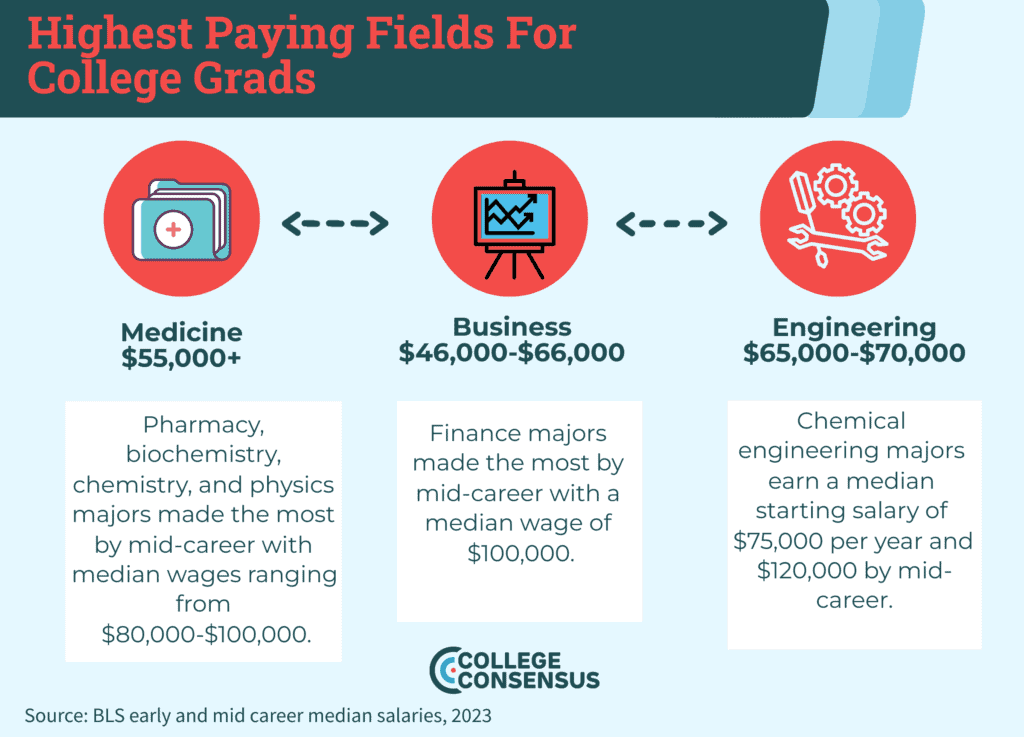Your high school guidance counselor or college academic advisor may tell you to follow your passion, but for a lot of Gen Z students pursuing college degrees during an economic recovery, there’s one overriding question – where’s the money? Where are the highest-paying jobs in America?

[Related: Check out our list of the best online degrees for getting a job]
Recommended Online Degree Programs
Explore our featured online programs to find the right match for you today.
What is the highest paid job?
So when you’re choosing your career path or looking for a new college degree, ask yourself: “What can I do that not many people can do?” If that answer is something that the job market values, you might find yourself in one of these Top 50 Highest Paying Careers.
The College Consensus guide to the Top 50 Highest Paying Careers is based on PayScale median salary, while we also consulted the Bureau of Labor Statistics for job growth rates and unemployment rates, where those statistics are significant.
1. Surgery

There’s a good reason that the professionals involved in surgery have some of the highest pay rates of any career – they do surgery. It’s well deserved, too, seeing as surgeons, anesthesiologists, and OBGYNs literally hold lives in their hands – and need a good 10-12 years of higher education to get qualified to do this high paying job, from college to medical school to a residency (sometimes up to 4 years). Each of these jobs is expected to see thousands of job openings in the next decade, and their unemployment rate is, simply, nil.
Median Salary:
Oral and Maxillofacial Surgeon – $355,864
Anesthesiologist – $278,016
Surgeon – $254,329
Obstetrician and Gynecologist – $207,177
Education Level: Doctorate
2. Psychiatrist

The doctors who care for our mental health, like the ones who put us to sleep and cut out our tumors, also make quite a healthy salary. Psychiatrists (as opposed to psychologists) go to medical school, spend years in residency, and have the responsibility of prescribing medicine, which requires more years of schooling, and often requires a more demanding workload than a psychologist. The psychiatrist approaches mental health as a component of physical health, and therefore gets paid a medical doctor’s salary. With more than 3000 projected jobs in the next decade, though, there’s room for more.
Median Salary: $194,507
Education Level: Doctorate
Check out our ranking of 10 Highest Paying Jobs in Psychology
3. Physician/Specialist

When you say you’re “going to the doctor,” 9 times out of 10 you mean a physician – a medical doctor who has been trained in general care for people. As with the other highest-paying jobs, physicians spend a lot of time in school, working in residencies, and just working in general – hours for a physician are long and demanding. In exchange for the sacrifice of time, physicians make a lot of money, with general practitioners making income approaching $200,000, and even more for specialists.
Median Salary:
Physician – $173,953
Pediatrician – $145,141
Podiatrist – $124,868
Education Level: Doctorate
4. Oral Medicine

It’s impossible to overestimate how important oral health really is. Diseases of the mouth can often be crucial, overlooked signs of larger issues, while poor oral hygiene can cause many other diseases, including cardiovascular diseases and dementia. While many Americans neglect their oral health, the people who are responsible for it make a well-deserved high salary. Dentists make around $125,000, while orthodontists can make as much as $170,000. They’re jobs that require many years of schooling, and face it – few people are cut out for looking in mouths all day.
Median Salary:
Orthodontist – $168,921
Prosthodontist – $151,723
Dentist – $125,464
Education Level: Doctorate
5. Nurse Anesthetist

While anesthesiologists are some of the highest-paid medical professionals, nurse anesthetists do pretty well for themselves too. An advanced practice nursing speciality, nurse anesthetists do pretty much what anesthesiologists do – administer anesthesia, monitor vitals – but they are required to do it under the supervision of a medical doctor. A master’s degree and a certification (CRNA) are required to work as a nurse anesthetist, and nurse anesthetists are generally expected to do the work of nurses as well, including aftercare. Their median 6-figure income is certainly well-earned.
Median Salary: $139,829
Education Level: Doctorate
Ready to start your journey?
6. Computer Network Architect

Businesses in the 21st century rise and fall on their communication, and the computer network architect is a crucial part of keeping communication going. The computer network architect designs data communication networks, which may be as small as one company’s intranet, to vast cloud networks. It’s a job with a huge amount of responsibility, and more than a few years of schooling (at least a master’s degree, in most cases); no one becomes a network architect without numerous years of experience, either.
Median Salary: $116,408
Education Level: Master’s
7. IT Manager

Generally speaking, an IT Manager is in charge of the IT department at a corporation or organization, working in a position of authority and responsibility over the technicians and computer systems analysts who keep an organization’s computer networks running. While you may work your way up from entry level to manager, in most cases an IT manager will need specialized education. An IT manager not only needs to be fully versed in the technology, but also in management skills and techniques, which may require a master’s degree. For the years of education and vital responsibility, an IT manager can expect over $100,000 per year.
Median Salary: $114,603
Education Level: Master’s
8. Pharmacist

In many ways, pharmacists are unsung heroes of the medical field; doctors may prescribe medicines, but it’s the pharmacist who makes sure patients get the right dose, in the right form, when they need it. To become a pharmacist, you need a Doctor of Pharmacy (PharmD) degree, as well as licensure from your state Board of Pharmacy. That comes down to many stressful hours of schooling, internship, study, and practice before getting to work as a professional, and while the job itself is fairly low-stress, it also carries a lot of responsibility and a salary to match.
Median Salary: $110,405
Education Level: Doctorate
9. Petroleum Engineer

It’s a simple rule of thumb that any occupation with “engineer” in the title is going to be well-paid, and that’s especially true for Petroleum Engineer. From fuel to plastics, modern life runs on petroleum, and the experts who have the applied scientific knowledge to optimize production, manage drilling sites, design equipment, and implement strategies earn their keep. Petroleum engineers need several years of highly specialized post-bachelor’s education, and work conditions may be extreme (oil and mild climates just don’t tend to go together) – both good reasons for high pay.
Median Salary: $100,583
Education Level: Master’s
10. Nurse Practitioner

These days, you’re far more likely to see a nurse practitioner than an MD when you go to your family clinic, and that’s a good thing. Most of the time, an NP can do anything a doctor can do, having learned most of the specialized knowledge that doctors learn, but they also have the hands-on experience and expertise – and bedside manner – of a nurse. In fact, in half of the US, nurse practitioners don’t even need the supervision of a doctor. NPs need a Master of Science in Nursing degree, as well as state licensure, to practice, and aspiring NPs should know the hours are just as long as nursing, with even more responsibility. The pay, though, helps make up for worn-out feet.
Median Salary: $91,697
Education Level: Master’s
Recommended Online Degree Programs
Explore our featured online programs to find the right match for you today.
11. Physician Assistant

Physician assistants make up one of the most crucial aspects of the healthcare system, because in many cases they are the difference between medical care and no medical care. The education for PAs comes close to that of medical doctors, ending at the master’s level, and PAs are qualified to examine, diagnose, and treat patients. In many rural and underserved areas without doctors, PAs are instrumental in providing medical care. While their pay rate is not as high as a full medical doctor’s, a physician assistant does not go unappreciated.
Median Salary: $91,348
Education Level: Master’s
12. Nurse Midwife

There are many specializations for advanced practice nurses, but Nurse Midwife is one of the most rewarding, in more ways than one. For women who want the comforting and less invasive care of a midwife, with the assurance of modern medicine, a nurse midwife is the best of both worlds. To practice, nurse midwives need a Master of Science in Nursing and licensure, and in most states nurse midwives must work under the supervision of an OBGYN. For the most part, though, nurse midwives are fully in charge of the birthing room and the care of pregnant women and their babies, and their salaries reflect that responsibility.
Median Salary: $89,158
Education Level: Master’s
13. Actuary

Actuarial science is a highly specialized area of accounting that combines accounting, statistics, and business. Actuaries use all that expertise to analyze risk for insurance companies, banks, government agencies, public or private sector, and more. Besides a lot of study and several years of higher education, it’s a job that very few people really have the mind for. For those who can do the math, an actuary is one of the best jobs out there for job security, workload, and pay rate. Since it’s a challenging niche, there are never enough actuaries, meaning a well-trained actuary can pretty much write their own ticket.
Median Salary: $83,620
Education Level: Master’s
14. Lawyer

It’s easy for laypeople to say there are too many lawyers, but that’s willfully forgetting just how critical lawyers are for just about every aspect of business, government, entertainment, healthcare, and more. Lawyers protect the accused from injustice, keep businesses on the straight and narrow, help families manage their assets in life transitions, and provide legal counsel when someone has been wronged. Lawyers need a Juris Doctor degree and licensure from their state Bar Association to practice, and their long hours, high stress, and big responsibility is repaid in a high median salary.
Median Salary: $81,648
Education Level: Doctorate
15. Operations Research Analyst

There’s a simple reason Operations Research Analysts make a high salary: math. To put it simply, operations research analysts use mathematics, statistics, and data to analyze business problems and create solutions. That may mean anything from making changes to the supply chain, to organizing products in a store for higher sales, to optimizing human resources. Since it’s a highly technical field, the education and skill set creates an automatic barrier to entry, so unemployment is low, job projections are high (growing by 27%), and median salary is stable and satisfying.
Median Salary: $77,118
Education Level: Master’s
Ready to start your journey?
16. Veterinarian

Veterinarian is high up on the list of jobs kids want when they grow up, but it isn’t all petting fluffy animals. Vets care for household pets, certainly, but they also care for zoo animals, farm livestock, and endangered species in captivity. They’re a crucial part of keeping the food supply healthy, preventing overpopulation of stray animals, and even researching climate change’s impact on wildlife. Veterinarians must earn a doctorate in veterinary medicine, which can take anywhere from 4 to 6 years, and be licensed in their state; some specializations may take even more education and certification.
Median Salary: $75,363
Education Level: Doctorate
17. Construction Manager

Some occupations are perennial, and construction is one. Construction may go through phases, depending on the economy, and some areas of construction may be seasonal, but one thing is for sure – people are always building. A good construction manager will never be out of work for long, whether it’s residential or commercial, government contracting or private sector. Construction managers and project managers may work their way into the job through experience, but a bachelor’s or master’s degree can provide skills and expertise that add to experience and help earn higher salaries.
Median Salary: $74,388
Education Level: Bachelor’s/Master’s
18. Psychologist

Unlike a psychiatrist, a psychologist is not a medical doctor, but an academic doctor. A psychologist may earn a Doctor of Psychology (PsyD) or PhD in Psychology; the primary difference is if you plan to work directly with clients as a therapist, or to work in education and research. Psychologists may find themselves in all kinds of workplaces and environments, from clinics and laboratories to business and marketing firms. Salary rates can fluctuate, depending on where a psychologist works, and in what capacity, but the high level of expertise and wide range of applicability gives psychologists a high median salary.
Median Salary: $73,921
Education Level: Doctorate
19. Business Operations Manager

The Business Operations Manager is the point person, the one who oversees the day to day operations of businesses large and small, troubleshooting problems, motivating employees, and communicating with the higher-ups. It’s a position that strong employees might work their way into through promotions, but these days, professional competition can be fierce. A higher business management degree like an MBA or Master’s in Management can be the key to making it. A tech degree like management information systems can also put you ahead of the competition. Strong managers can not only count on a high median salary, but opportunity to break through to the executive suite.
Median Salary: $72,988
Education Level: Master’s
20. Statistician

Any college student who has eked out a passing grade in a statistics class will tell you – anyone who can handle statistics is worth their weight in gold. Because it is a highly specialized skill set, statisticians are in high demand in a wide variety of fields – finance, insurance, technology, entertainment, healthcare: you name it, there’s a place for statisticians. The education level necessary for a career in statistics varies, but a master’s degree will usually provide the expertise and adaptable skills that a statistician can carry into any number of career paths.
Median Salary: $71,550
Education Level: Master’s
Recommended Online Degree Programs
Explore our featured online programs to find the right match for you today.
21. Database Administrator

In the era of Big Data, Database Administrators are among the most important members of any corporate team. Database administrators design and build databases for customer information, organizational data, financial information, and any other kind of information that their organization needs to function. They are also responsible for protecting that information, and making sure it is useful and accessible. The importance of database administrators, and their high level of specialized education, translates to a sizable salary level.
Median Salary: $71,458
Education Level: Master’s
22. Industrial Psychologist

Once upon a time, organizational management was a matter of instinct, experience, and luck. Today, Industrial Psychology has made a science of the workplace, applying the insights of psychology to interoffice behavior, consumer behavior, decision-making, assessments, and other business concerns like ethics and law. Industrial psychologists need at least a master’s degree in psychology, and preferably a specialization in the field, though a doctorate may increase your career potential.
Median Salary: $71,437
Education Level: Master’s
23. Information Security Analyst

In the information age, one of the greatest dangers to businesses, governments, and individuals is cybercrime. Hacking of personal data, financial data, and government information has become one of the main threats to security, and with the growth of Big Data and more life being lived online, criminals will continue to capitalize on weaknesses. That makes Information Security Analysts some of the most important people in any organization. The people who keep networks and information protected, like computer support specialists, need to combine a strong education with deep and diverse experience, making their salary expectations higher as well.
Median Salary: $70,522
Education Level: Bachelor’s/Master’s
24. Financial Manager/Analyst

The job of a Financial Manager is to oversee the financial operations of a business, such as maintaining proper records, writing reports and white papers, and making sure that finances are in order. A Financial Analyst, on the other hand, analyzes a businesses finances, such a investments, cash flow, and returns, to make recommendations on what has worked in the past, and the best way forward. Both jobs require a business degree, preferably a master’s, and both are growing at an above average rate, with solid median income and potential.
Median Salary:
Financial Manager – $70,095
Financial Analyst – $58,646
Education Level: Bachelor’s/Master’s
25. Software Developer

A Software Developer oversees the whole development process of a computer program, from determining problems to be solved or customer desires to be met, to leading a team of programmers, to getting a product on the market. Some software developers work primarily as managers, while others work directly in programming, depending on the complexity of the project. A bachelor’s degree in computer science, computer engineering, software engineering, or a similar specialty may be useful, though for management many companies will want a master’s; however, in many companies, experience is more important than any education.
Median Salary: $69,411
Education Level: Bachelor’s/Master’s

Recommended Online Degree Programs
Explore our featured online programs to find the right match for you today.
26. Physical Therapist

When an injury, age, or sickness keeps you from moving effectively, where do you turn? To the Physical Therapist, that’s where. Physical therapy is one of the fastest-growing specializations in healthcare, with jobs expected to increase by 28% in the next decade. There’s lots of reasons for that, including more active adults and a huge number of aging Baby Boomers, but it’s also simply because we understand the benefits better. A physical therapist needs a Doctor of Physical Therapy degree and a state certification to practice.
Median Salary: $69,169
Education Level: Master’s/Doctorate
27. Mechanical Engineer

Mechanical engineering is one of the most hands-on engineering occupations, rooted in the long history of applied science. Mechanical engineers design and build mechanical devices and mechanical systems, from tools and engines to thermal sensors and nanotechnology. To begin a career as a mechanical engineer, a bachelor’s or master’s degree in the field is a must; it’s highly specialized, and needs not only a deep level of education, but a lot of practical, experiential learning. You may also need a certification or license in your state. Industrial engineers work in similar areas.
Median Salary: $68,588
Education Level: Bachelor’s/Master’s
28. Radioactive Medicine

Radioactive medicine technicians – including Radiation Therapist, Nuclear Medicine Technologist, Radiologist, and MRI Technologist – are some of the best-paying jobs you can get with just an associate’s degree, and they play an important part in modern medicine. Radiation therapists administer radiation treatments for cancer patients to shrink and destroy tumors; Nuclear Medicine Technologists prepare and administer the radioactive drugs used in imaging, and operate imaging equipment; Radiologists operate X-Ray equipment, while MRI Technologists operate MRI imagine equipment. The highly specialized – as well as rather risky – nature of the job means that radiation therapists and nuclear medicine technologists must be exceptionally well-trained. The job also carries its fair share of stress and difficulty, so they are generally well-paid, well above average for other jobs of the same education level.
Median Salary:
Radiation Therapist – $68,563
Nuclear Medicine Technologist – $65,702
Radiologic and MRI Technologist – $62,976
Education Level: Associate’s
29. Computer Systems Analyst

While the Network Architect (#6 above) is the person who designs and implements networks for businesses, it’s the Computer Systems Analyst who examines the structures in place and finds ways to improve them. The systems analysts understands both the needs of the business, and the capabilities of the system, and comes up with ways for the two to work at their maximum efficiency and effectiveness. A bachelor’s or master’s degree in computer science is the way into the field, but experience will make the biggest difference in a successful career as a systems analyst.
Median Salary: $66,910
Education Level: Bachelor’s/Master’s
30. Compliance Officer

The Compliance Officer is one of the most important positions in any major corporation, though they’re not necessarily the person executives want to see come calling. The compliance officers’ job is to make sure a business is operating within proper legal and ethical boundaries, and that a company is keeping up with regulations, industry standards, and internal policies. In other words, the compliance officer keeps a company out of trouble, and even if no one wants to get an email from their compliance officer, they’re well-rewarded in pay for such a critical job.
Median Salary: $65,368
Education Level: Bachelor’s/Master’s
31. Occupational Therapist

Occupational Therapy is closely related to Physical Therapy (#26 above), in that both are dedicated to helping people recover and improve their capabilities after injury or sickness. However, occupational therapists work in a broader scope, helping patients relearn or develop everyday skills, such as feeding, dressing, or cleaning themselves; they may also work with disabled children to teach them self-care skills. Occupational therapists need at least a master’s degree, rather than a doctorate, and must be licensed in the state where they practice.
Median Salary: $64,747
Education Level: Master’s
32. Medical and Health Services Manager

Without a doubt, healthcare is the field to be in if you want job security, high salaries, and the ability to help people as well, but not everyone is cut out for nursing or medicine. Fortunately, Medical and Health Services Managers can capitalize on the explosive growth in the healthcare industry, without having to encounter explosive growths in the emergency room (sorry). A bachelor’s or master’s degree in management is a good start, and specialized healthcare management degrees have become quite common – and are often available online.
Median Salary: $64,702
Education Level: Bachelor’s/Master’s
33. Orthotist and Prosthetist

When patients need medical support devices, whether that means artificial limbs, braces, eyes, or other orthotics, they turn to Orthotists and Prosthetists. These are the professionals who build and fit prosthetics, helping patients find the right devices to improve their mobility, independence, and quality of life. An orthotist or prosthetist needs a master’s degree in the field, as well as a residency, and in many states a certification or license is also required to practice. The field is changing every day, and the specialized knowledge and skills of an orthotist/prosthetist is well compensated.
Median Salary: $64,568
Education Level: Master’s
34. Civil Engineer

Civil Engineers are well-educated, well-respected, and well-paid, and well they should be – they’re the ones who turn our infrastructure from idea to reality. Civil engineering is as old as civilization, and their job hasn’t changed much, even as the tools and capabilities have; they design, build, and maintain buildings, bridges, tunnels, waterworks, and every other structure that makes civilized life possible. A civil engineer needs at least a bachelor’s degree, but leadership positions will be more in reach with a master’s, and experience is key to reaching the highest levels of responsibility and income.
Median Salary: $63,955
Education Level: Bachelor’s/Master’s
35. Marketing Manager

In the 21st century, half of business is marketing. We just made that up, but as far as anyone can tell it’s true; competition in just about every field is so intense, building a strong brand may be the only difference between dominance and disappearance. A Marketing Manager oversees the marketing operations of a corporation, business, or organization, leading marketing campaigns and making sure that the employer or client’s marketing stays on-brand. A bachelor’s or master’s degree in management will provide the skills to lead teams, analyze and make marketing decisions, and craft successful campaigns.
Median Salary: $62,741
Education Level: Bachelor’s/Master’s
Ready to start your journey?
36. Registered Nurse

Registered Nurses are the backbone of the healthcare system, the people who do the crucial one-on-one work with patients in hospitals, emergency rooms, clinics, and every other healthcare facility. To become an RN, you need an associate’s degree in nursing (from a community college or nursing school) or a hospital diploma, and pass the NCLEX exam to be licensed as a registered nurse in your state. There is no shortage of jobs, and pay rates can be quite high, especially in specialized areas like ER, neonatal, or oncology department.
Median Salary: $62,007
Education Level: Associate’s
37. Epidemiologist/Medical Scientist

Doctors and nurses work directly with patients to treat their illnesses and injuries, but where do the knowledge, treatments, and therapies they use come from? It’s the researchers behind the scenes who help medical professionals know what treatments work, how diseases spread, and how to prevent illness and injury. Epidemiologists study population and geographical trends to understand the spread of disease, while Medical Scientists study medications, diseases, medical devices, and other aspects of medicine from a scientific perspective. At least a master’s degree, and often a doctorate, is the standard for working as an epidemiologist of medical scientist.
Median Salary: $61,693
Education Level: Master’s/Doctorate
38. Chiropractor

The doctors who manipulate your spine and joints to relieve chronic pain get paid quite well, and wouldn’t you want them to? A Doctor of Chiropractic degree requires many hours of residency and many years of schooling, and the job itself is a lifesaver to many patients experiencing pain. Chiropractors must be licensed in the state where they practice, but because they do not perform surgery or prescribe medications, they are usually able to operate more independently than most doctors. Many own their own practice and set their own hours, making chiropractic not only a rewarding job financially, but personally as well.
Median Salary: $59,880
Education Level: Doctorate
39. School Psychologist

School Psychologists do not get paid as much as psychologists with their own private practice – let’s get that out of the way right away. But they are essential to modern education, providing services that help keep schools healthy and safe for students and faculty alike. School psychologists help students with mental illness and disabilities find the support they need; they provide counseling for grieving or distressed students; they address school-wide issues like bullying, motivation, and discipline; and they are at the center of crisis intervention and prevention. Individuals who want to make a difference in students’ lives as a school psychologist will need a master’s or doctorate degree, and usually need state licensure.
Median Salary: $59,419
Education Level: Master’s/Doctorate
40. Speech-Language Pathologist

Speech-Language Pathologists are trained in diagnosing and treating issues that affect speech and swallowing, from stroke and Parkinson’s in adults, to hearing loss and autism in adults and children. To become a speech-language pathologist, you will need at least a master’s degree in the field to learn the foundations of speech pathology, and the treatments you will be using. All states require some sort of licensure, and further certification may be necessary to work in schools.
Median Salary: $59,245
Education Level: Master’s/Doctorate
41. Financial Advisor

Having more money than you know what to do with is a good problem to have, but it’s still a problem. Financial advisors come to the rescue for families who need help sorting out finances after the death of a loved one, making investment decisions, managing retirement, and more. At least a bachelor’s degree is necessary to get a job as a financial advisor, but more specialized master’s or certificate work can help you stand out on the job market. More schooling can also give you the confidence to strike out on your own as an independent consultant, or help you start your own firm.
Median Salary: $58,672
Education Level: Bachelor’s/Master’s
42. Web Developer

Web Developers make the internet what it is, designing and building websites and pages to work at their best. While web developers may design the look of sites, they are more often responsible for the technical functioning of the site (especially if they are working in a team that includes a web designer). Developers must be well-versed in the most common programming languages for the web, and keep up with new developments as well. A bachelor’s or master’s degree can be helpful for getting work in the field, but certifications, continuing education, and workshops may be more important for staying current.
Median Salary: $58,030
Education Level: Bachelor’s/Master’s
43. Technical Writer

Technical Writers do the unglamorous writing – user’s manuals, instructions, directions, business documents, and all of the other necessary writing that makes the world go round. A good technical writer should have the research and technical skills to write about any topic, product, or process; if they don’t know about it when they start the job, they’ll know as much as an expert by the time they’re done. A bachelor’s or master’s degree proves that you have the expertise, but nothing will get you farther in technical writing than experience, and a portfolio of excellent work.
Median Salary: $57,755
Education Level: Bachelor’s/Master’s
44. Sales Manager

A good salesperson is hard to find, but a good sales manager is even tougher – someone with the skills to be a top salesperson on their own, but with the interpersonal and managerial skills to lead a team of salespeople. A good sales manager brings out the best in their team, finding and hiring the right people and motivating them to higher goals. Most managerial positions will expect a bachelor’s degree as a minimum to apply, but nothing makes a great sales manager like experience.
Median Salary: $56,667
Education Level: Bachelor’s
45. Diagnostic Medical Sonographer

Like radioactive medicine technicians (#28 above), Diagnostic Medical Sonographers are some of the best-paid jobs you can get with just an associate’s degree. Sonographers operate sonogram and ultrasound machines, which use high-frequency sound to create images of internal organs and tissues. Sonographers may work with pregnant women, in cardiovascular units, in sports medicine or physical therapy clinics, and other environments where sonography is used. With just a 2-year degree, diagnostic medical Sonographers can make more than $50,000 a year, and even upwards of $60,000 or $70,000.
Median Salary: $53,692
Education Level: Associate’s
46. Political Scientist

These days, everybody’s a political scientist – or, at least, everybody thinks they are, whether they really know what they’re talking about or not. But real political scientists are a little more well-read and knowledgeable than the average internet troll, having been through a master’s or doctoral program studying and researching the political process. Political scientists study policy, trends, voting patterns, and other political topics, and usually work for the government, in education, or for nonprofits and lobbying organizations, where their expertise can be put to practical use.
Median Salary: $53,566
Education Level: Master’s/Doctorate
47. Dental Hygienist

Dental Hygienists join that esteemed group of associate’s-degree occupations that can earn a high salary and relative job security. In fact, there aren’t nearly enough hygienists to keep up with market demand – the job is expected to grow by 20% over the next decade, by more than 40,000 jobs. While they don’t have the expertise (or make the salary) of dentists, hygienists do most of the heavy lifting and interaction with patients, so it’s a good job for people who like working directly with people. Just an associate’s degree and certification or licensure is all that a dental hygienist needs.
Median Salary: $53,297
Education Level: Associate’s
48. Cost Estimator

Cost Estimators have a very specific job, and it’s one that happens to be a lot harder than you may initially think: they have to figure out how much a project is going to cost. To be specific, cost estimators working in construction, business, government, or other fields have to research and analyze data to determine what it will take to, for example, build a building or implement a new policy: the time, materials, manpower, and expenses. That takes a lot of specialized knowledge, and usually at least a bachelor’s degree in engineering, finance, business, or a more industry-specific discipline (construction management, for example).
Median Salary: $53,066
Education Level: Bachelor’s
49. Clinical Social Worker

Where non-clinical social workers may help clients with issues like finding a job or getting to rehab, a Clinical Social Worker is a much more intensive, working with individuals and families to confront drug addiction, domestic violence, mental illness, and more in a clinical (as opposed to community) setting. A clinical social worker should have a master’s degree and be certified as a Licensed Clinical Social Worker (LCSW), and will usually work in a hospital, rehabilitation facility, or some similar place. Their higher level of education and responsibility means clinical social workers are generally paid much more than non-clinical social workers.
Median Salary: $52,234
Education Level: Master’s
50. Dietitian and Nutritionist

Before the chorus of “Well, actually…”; yes, we know – Dietitians and Nutritionists are two different jobs. Registered Dietitians are licensed to provide detailed dietary advice and produce meal plans for clients, while Nutritionists (even certified nutritionists) can only provide general nutritional and dietary advice – not tell anyone what they should or should not eat. Therefore, all dietitians are nutritionists, but not all nutritionists are dietitians. However, the BLS treats them the same way, and regardless of which you call yourself, it’s a fast-growing, in-demand occupation, and that shows no slowing down in the future.
Median Salary: $51,464
Education Level: Bachelor’s/Master’s
What is the top 5 salary in the US?
As always, the highest of the highest-paying careers are in medicine, for obvious reasons. The healthcare system is in a long period of phenomenal growth, and the barriers to entry are so high that the field is self-selecting. Quite simply, between the education, the stress, and the responsibility there just aren’t many people who are cut out to be surgeons, physicians, or nurse midwives. If you can make it, you can make top salaries and gain a high paying job with a doctoral or professional degree.
| Job Title | Salary |
|---|---|
| Anesthesiologist | $239,200 |
| Obstetrician/Gynecologist (OB-GYN) | $239,200 |
| Oral Surgeon | $239,200 |
| Psychiatrist | $226,800 |
| Nurse Anesthetist | $203,900 |
Then there’s the tech field, which has jobs like software engineers and cybersecurity experts. These jobs also bring in a lot of cash. Another area where people make good money is finance. Think about investment bankers and financial advisors—they’re known for their big earnings. And let’s not forget about the big bosses at companies. They rake in hefty paychecks too. These jobs offer great earning potential and are popular choices for folks looking to make a lot of money in their careers.
That’s the trend in most of the majors that make the most money: in a professional field, a lot of education, a lot of responsibility, or a lot of risks generally equates to a high salary. Petroleum engineers, actuaries, financial managers, and technical writers all have something in common; if you do something that only a few, highly skilled people can do, you should be paid what you’re worth.
Related Articles:
Highest Paying Online Associates Degrees
Highest Paying Online Bachelors Degrees
Highest Paying Online Masters Degrees


